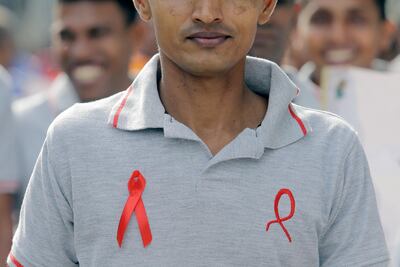Progress in drug and vaccine research has transformed the treatment landscape for those living with HIV.
Although a cure may remain elusive, researchers at the largest vaccine producer in the world claim preventative medication is better than ever.
World Health Organisation figures reveal continuing progress in improving the lives of 38 million adults and children living with the virus.
Emmanuel Hanon, senior vice president head of research and development at GlaxoSmithKline vaccines, said prophylactic HIV drugs are now 99 per cent effective.
“HIV is not yet curable, but it is very treatable,” he said. More than half (53 per cent) of HIV carriers have had the virus suppressed, limiting the risk of infecting others while 79 per cent have been tested and 62 per cent are receiving treatment.
“Those with the virus who die are not dying as a result of classical HIV symptoms, but from other diseases [that the rest of the population get].
“The dream of having a vaccine is closer. We are exploring a vaccine candidate to help prevent infection, as part of the P5 consortium with other pharma companies.”
GSK Global is in partnership with the US National Institutes of Health, Gates foundation and Sanofito develop a prophylactic vaccine that potentially can be used as a global health asset in regions where the drugs are not used.
It is 25 years since scientists developed the first arsenal of anti-retroviral drugs capable of limiting the devastating impact of the disease.
Since then, drug treatment programmes have been updated and refined to become more effective and with significantly fewer side effects.
When taken with a daily oral pill, someone with HIV can live a nearly normal lifespan.
An ambitious plan has been launched in the US by the Department of Health and Human Services to reduce the incidence of HIV domestically by 75 per cent within five years, and by 90 per cent by 2030.
Research and drug development is underway at GSK to potentially offer an injection to protect against the HIV for up to two months, rather than taking a daily pill.

GSK is the world’s largest vaccine research and development company distributing to 158 countries, including the UAE.
It can take between 10-26 months to manufacture a single batch of vaccine. That follows years of research and development into finding new and effective drug treatments.
Currently, GSK is collaborating with more than 150 scientific institutions on innovative solutions to pressing healthcare problems threatening human health.
One of those is a new HIV vaccine, currently in phase two of the research and development stage.
ViiV Healthcare, a joint venture between GSK and Pfizer, was established in 2009 with more than 1,100 employees dedicated to developing HIV treatments.
“The treatment bar for HIV is already very high,” said Mr Hanon, who was speaking from the company’s largest manufacturing plant in Wavre, near Brussels.
“Because of this, unless there is a major discovery in the field that can completely block it, HIV is not an easy target for developers.
“Research and development at GSK is underway now where people can have an injection and they are protected (against the virus) for two months, rather than (having to) take a pill every day.
“On the therapeutic side, it is even more challenging [to develop a vaccine] as someone can now already access highly effective treatment.
“We are in phase two proof of concept for a vaccination schedule for HIV but in developed countries, HIV drugs are already doing an amazing job.”


